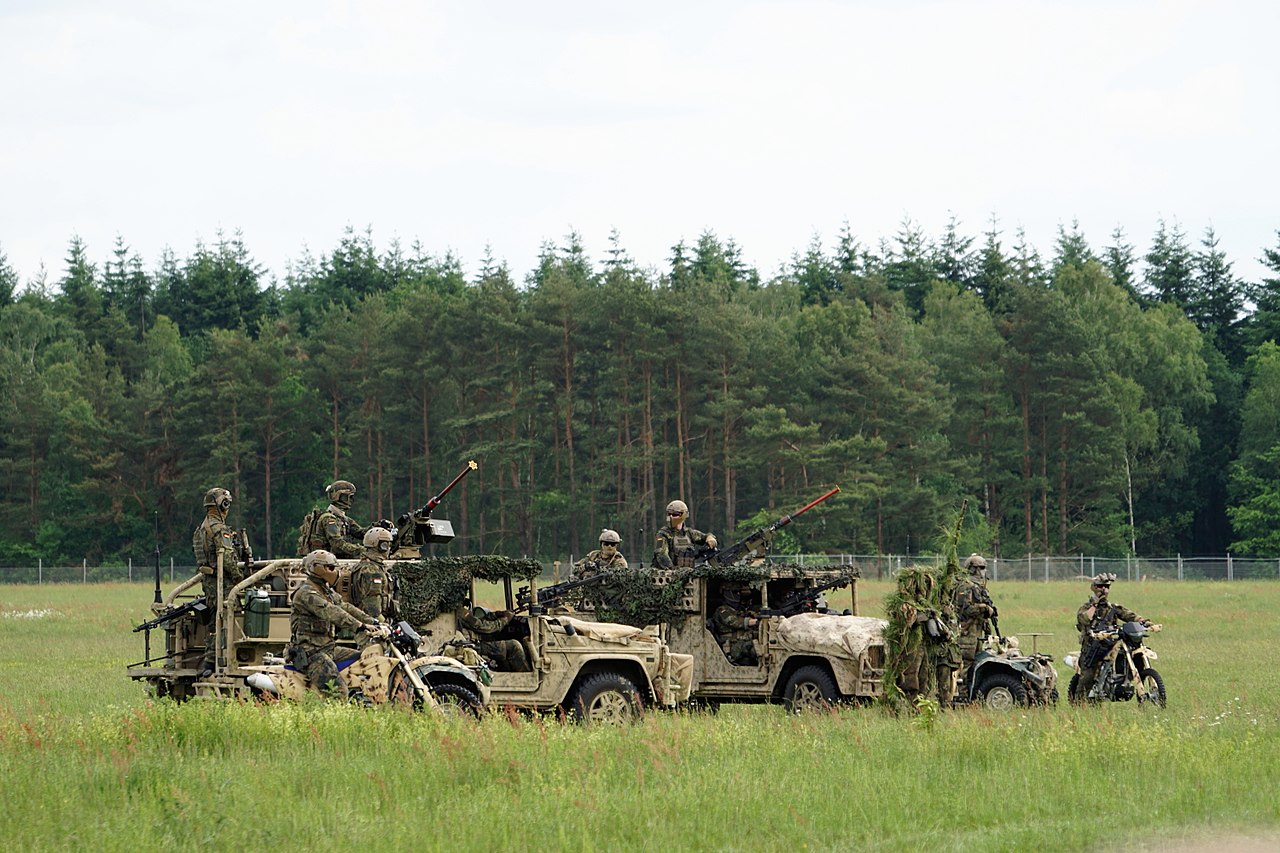Politics surrounding Germany’s armed forces – the Bundeswehr – is fiercely contested: politically, some (not least the U.S. President) are demanding a reversal of decades of cutbacks, while others view such plans with scepticism and distrust. Operationally, the forces have been much affected by severe staff and materiel shortages, as well as by corruption scandals in procurement. Now, the Bundeswehr is facing a further series of questions – about its political loyalties.
A long backstory of far-right organising
Earlier this year – and in response to persistent indications of the systematic prevalence of far-right and neo-Nazi ideas in the Bundeswehr’s most elite unit, the Kommando Spezialkräfte (KSK) – the Defence Ministry had commissioned a report assessing the KSK’s morale. The results, released on June 30, are not reassuring.
As Euro-Islam has reported, KSK soldiers figure prominently in the far-right ‘Uniter’ network, discovered in 2019: bringing together KSK personnel, members of German intelligence agencies, and local Christian Democratic politicians with a neo-Nazi bent, Uniter had been preparing for the overthrow of the government, as well as for the execution of political opponents.
Yet the Defence Ministry had stepped up its attention to the KSK already since 2017. Back then a party organised for the farewell of a corps leader had involved the singing of Nazi chants and the tossing of pigs’ heads.1 Having come to the conclusion that it could no longer afford to turn a blind eye, the Ministry ordered the now-concluded investigation.
Elite unit with powerful esprit de corps
The KSK (whose name translates as Commando Special Forces) was founded in 1996. Its main task are small-scale, high-risk operations abroad – such as the liberation of hostages. The four units that make up the Commando have a nominal overall strength of 1,700 soldiers. Currently, however, only about 1,000 men (and a few women) serve in the KSK.
20 KSK members have been identified by the investigative commission as “far-right extremists” (Rechtsextremisten), as the official German parlance has it. Yet this is arguably only the tip of the iceberg: while quick to inflate the number of ‘Islamists’ under its watch, German intelligence agencies have always been quite cautious in extending the label ‘right-wing extremist’.
What is more, members of the military intelligence agency MAD, responsible for conducting the inquiry, leaked confidential information to the KSK. This enabled the elite unit to ‘clean up’ before being investigated.2
Reform agenda until October 31
In spite of these hiccups, the final report comes to a damning conclusion. Apparently, the Commando had been allowed to develop a life of its own since its founding. The training of KSK recruits and the promotion of higher-ranking officers remained insulated from regular Bundeswehr structures. As a result, high-ranking far-right personnel could – without much effort – ensure the ideological cohesion of the troops under their control.
One of the four units that make up the Commando has now been disbanded: its far-right esprit de corps was deemed too strong for the unit to be salvageable. The report concludes that the KSK “cannot continue to exist in its current constitution”; a fact that led Defence Minister Annegret Kramp-Karrenbauer (CDU) to suggest that the entire KSK might be dissolved, in case internal reform efforts should be deemed insufficient by October 31.3
Until that date, investigators will also try to establish what happened to large amounts of ammunition and explosives that a cursory inventory revealed to be missing from KSK depots. As of now, almost 50,000 rounds and 62kg of explosives remain unaccounted for.4 The most likely explanation is that these were stolen and are now squirreled away in hidden weapons stockpiles built up by Uniter and other far-right groups.
Support for the Defence Ministry’s stance
Political reactions to the steps taken by the Defence Ministry have been mostly positive. Social Democrats and Greens in particular have lauded Annegret Kramp-Karrenbauer’s response to the report.
Others have been more sceptical. The far-right Alternative für Deutschland (AfD) party criticised “the ineffable and completely unfounded general suspicion against our soldiers”. And politicians from left-wing Die Linke asserted that the KSK should be abolished in its entirety.5
In any case, it is obvious that the case of the KSK does raise further questions. Why is it, for instance, that the Commando was left to its own devices for 25 years, with neither the formal Bundeswehr hierarchy nor the Defence Ministry willing to bring it to heel? And what does this failure tell us about the wider authority structures and political sympathies prevailing in Germany’s military apparatus?
Enduring questions about Germany’s security apparatus
The fact that the MAD agency leaked the details of the investigation to concerned KSK members gives pause in this regard. It highlights that the country’s intelligence and security agencies might be so shot through with far-right sympathies as to be incapable of self-monitoring.
Indeed, on the same day that Annegret Kramp-Karrenbauer announced her emergency measures targeting the KSK, it was revealed that a far-right reservist of the regular Bundeswehr had apparently been compiling a death list of leading public and political figures.6
And even the partially compromised MAD just announced that it ‘discovered’ 600 far-right extremists among the Bundeswehr’s regular ranks. Such revelations surely represent a severe dent in the armed forces’ attempt to present themselves as a more diverse, more progressive institution.
Critical perspectives
Thus, more critical commentators have pointed to the shortcomings of the official plans for the Commando’s restructuring. Journalist and writer Jagoda Marinić observed that dissolving the KSK or some of its component parts was unlikely to address the problem: with soldiers simply taking up new positions elsewhere in the army, far-right ideology would not be eradicated but merely redistributed.
And Ali Mete of the IslamiQ news portal opined: “If there’s racism among special forces – a unit whose members are vetted carefully before and during their service – then is it not obvious that right-wing structures exist and are widespread in the Bundeswehr?” https://twitter.com/AliMete82/status/1278028273264492544
Sources
https://www.faz.net/aktuell/politik/inland/rechtsextremismus-so-will-akk-beim-ksk-aufraeumen-16841406.html ↩
https://www.migazin.de/2020/07/01/rechtsextremismus-kramp-karrenbauer-bundeswehr-elitetruppe/ ↩
https://www.faz.net/aktuell/politik/inland/rechtsextremismus-so-will-akk-beim-ksk-aufraeumen-16841406.html ↩
https://www.tagesschau.de/inland/ksk-teilaufloesung-105.html ↩
https://taz.de/Liste-mit-Adressen-von-Politikern/!5697652/ ↩






